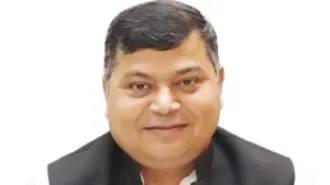What to Expect From ProPublica in a Second Trump Administration
A former aide to Rep. Don Bacon, a Nebraska Republican, said she intervened on the company’s behalf even though she thought it was inappropriate. “It was specifically the congressman that suggested I needed to deal with it.”

Series: A Closer Look: Examining the News
Donald Trump’s victory marks a turning point in the American experiment, and there is much to be dissected about what it means.
We will leave that analysis to others.
Our role as an investigative news organization lies elsewhere. In the coming months and years, we will be devoting a significant portion of our staff to chronicling the effects of what promises to be a drastic change in the role of the federal government in all of our lives.
This is nothing new for us. Over the past three presidential administrations, we have closely covered the actions of the federal government, from the Navy’s propensity for building expensive ships that aren’t seaworthy to the failings of regulators to protect the public’s health and safety.
I’ve been a reporter and editor for more than four decades, long enough to see the pendulum of public sentiment swing from the presidencies of Ronald Reagan to Barack Obama to Trump. At moments of seismic shift in our country, I like to look back on the words of Adolph S. Ochs when he took control of The New York Times in 1896. The paper, he wrote, would “give the news impartially, without fear or favor, regardless of party, sect, or interests involved.”
In the 21st century, “without fear or favor” means maintaining a fact-based, data-driven approach to journalism. Our job is to give readers an independent, verifiable account of what’s happening, even if the president is calling us enemies of the people or bloodsuckers. At ProPublica, our mantra is that we bring the receipts to every story we publish.
We are journalists, not leaders of the resistance.
There are some who will argue that ProPublica’s model of doing journalism that spurs reforms will be hobbled when one political party controls both branches of Congress and the White House.
I do not agree.
Again and again, we have seen powerfully documented stories stir change in states dominated by one party. One example: Our series on Florida’s shabby treatment of the families of children born with brain injuries prompted Gov. Ron DeSantis and the Republican-led Legislature to take immediate action. ProPublica’s story that included a recording of a 6-year-old Salvadoran girl wailing for her mother prompted an immediate end to the first Trump administration’s policy of deterring migrants by separating families.
As we have done for each presidential administration since 2008, our reporters will begin with basic questions about new government policies: Who is benefiting? Who is suffering? What are the unintended consequences?
We are mindful that we may be entering a new era, one without precedent. Trump’s first administration, which included two impeachments, was defined by his penchant for smashing norms.
There will be far fewer guardrails in the second Trump presidency. The Supreme Court’s decision declaring presidents presumptively immune from prosecution for official acts and the return of Republican control of the Senate, and perhaps the House, mean there will be few, if any, checks on the power of the president.
Trump famously said that he wouldn’t be a dictator, “except for Day One.” In fact, it will take a while for a picture to emerge of how he plans to use the expansive authority of his office.

The coming months will feel as chaotic as they always do during a transition. Various figures in the president-elect’s orbit will be jockeying for influence and will leak transition team documents in hopes of turning them into reality. You will read many stories about proposals for radical change in every government agency. Some will be embraced. Many more will be cast aside, never to be seen again.
Of course, ProPublica reporters would be delighted to receive any and all leaks sources can share about the transition. You can reach our whole team at propublica.org/tips if you have a tip for us to investigate. You can also text or call 917-512-0201 or send us a message at that number on Signal, a secure messaging app.
While Trump’s campaign speeches were less than linear, he has been clear and consistent about his plans in many areas. Some, like health care and taxes, are subjects ProPublica has long closely covered. Others, like his plan for imposing much higher tariffs on imported goods, open up whole new arenas of inquiry for us.
The campaign pledge with the greatest immediate impact will be his plan to deport millions of people who entered this country illegally. Karoline Leavitt, the campaign press secretary, told Fox News on Wednesday that Trump will begin “the largest mass deportation operation” in American history on his first day in office.
Previous presidents have stepped up the enforcement of immigration laws, notably Trump in his first term and Obama. But the United States has not attempted mass arrests of migrants since 1954, when border agents rounded up more than 1 million people living in Texas and California and forcibly transported them to Mexico.
We have been closely covering immigration, and our recent series of stories of its impact on towns like Del Rio, Texas, and Whitewater, Wisconsin, reflect our emphasis on deep, on-the-ground reporting. If Trump carries out his pledge to round up and expel 15 million to 20 million people, we will cover it in ways that go beyond the day’s headlines.
Jesse Eisinger, one of our senior editors, delivered some remarks to his staff this morning that sum up how I believe reporters at ProPublica and elsewhere should be approaching this moment.
“We face the biggest test of our professional lives,” he told them. “Now we get to see if we really meant it when we said we will hold power to account. Will we do so when our subjects have true power on their side and a willingness to use it? We may be harassed. We may be sued. We may be threatened with violence. We may be ignored. Are we just sunshine journalists or are we ready?”

ProPublica is a nonprofit newsroom that investigates abuses of power. Sign up to receive our biggest stories as soon as they’re published.
ProPublica is a nonprofit newsroom that investigates abuses of power. Sign up to receive our biggest stories as soon as they’re published.






